苏教出版牛津高级中学英语语法归纳
苏教版牛津高中英语语法总结
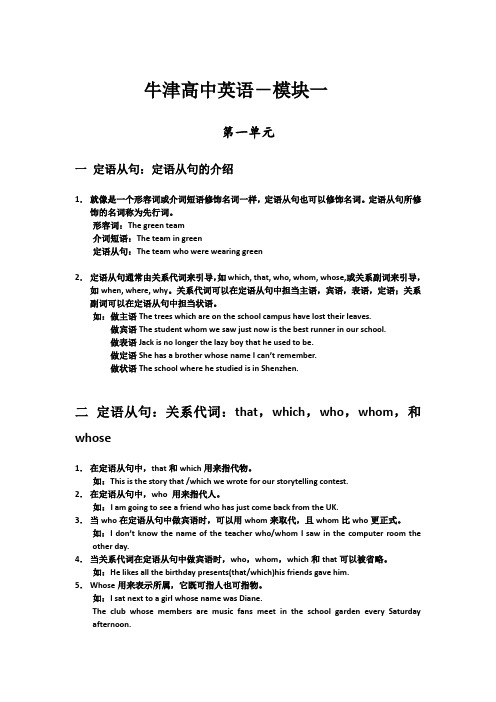
牛津高中英语-模块一第一单元一定语从句:定语从句的介绍1.就像是一个形容词或介词短语修饰名词一样,定语从句也可以修饰名词。
定语从句所修饰的名词称为先行词。
形容词:The green team介词短语:The team in green定语从句:The team who were wearing green2.定语从句通常由关系代词来引导,如which, that, who, whom, whose,或关系副词来引导,如when, where, why。
关系代词可以在定语从句中担当主语,宾语,表语,定语;关系副词可以在定语从句中担当状语。
如:做主语The trees which are on the school campus have lost their leaves.做宾语The student whom we saw just now is the best runner in our school.做表语Jack is no longer the lazy boy that he used to be.做定语She has a brother whose name I can’t remember.做状语The school where he studied is in Shenzhen.二定语从句:关系代词:that,which,who,whom,和whose1.在定语从句中,that和which用来指代物。
如:This is the story that /which we wrote for our storytelling contest.2.在定语从句中,who 用来指代人。
如:I am going to see a friend who has just come back from the UK.3.当who在定语从句中做宾语时,可以用whom来取代,且whom比who更正式。
苏教版牛津高中英语语法总结
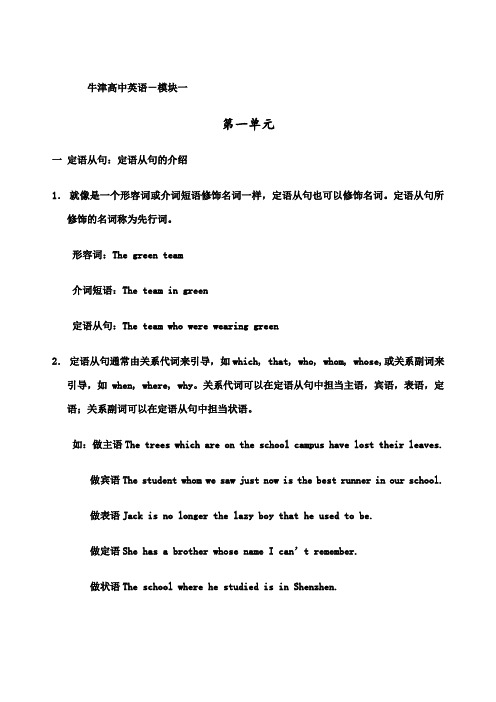
牛津高中英语-模块一第一单元一定语从句:定语从句的介绍1.就像是一个形容词或介词短语修饰名词一样,定语从句也可以修饰名词。
定语从句所修饰的名词称为先行词。
形容词:The green team介词短语:The team in green定语从句:The team who were wearing green2.定语从句通常由关系代词来引导,如which, that, who, whom, whose,或关系副词来引导,如when, where, why。
关系代词可以在定语从句中担当主语,宾语,表语,定语;关系副词可以在定语从句中担当状语。
如:做主语The trees which are on the school campus have lost their leaves.做宾语The student whom we saw just now is the best runner in our school.做表语Jack is no longer the lazy boy that he used to be.做定语She has a b rother whose name I can’t remember.做状语The school where he studied is in Shenzhen.二定语从句:关系代词:that,which,who,whom,和whose1.在定语从句中,that和which用来指代物。
如:This is the story that /which we wrote for our storytelling contest. 2.在定语从句中,who 用来指代人。
如:I am going to see a friend who has just come back from the UK.3.当who在定语从句中做宾语时,可以用whom来取代,且whom比who更正式。
(完整word)苏教版牛津高中英语语法总结,推荐文档
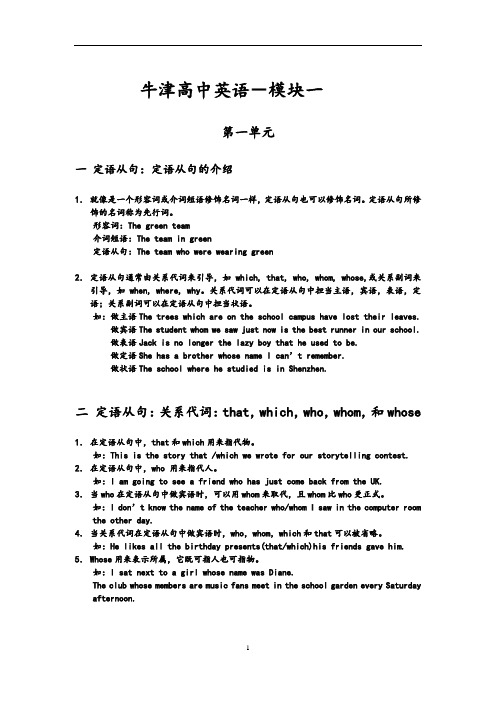
牛津高中英语-模块一第一单元一定语从句:定语从句的介绍1.就像是一个形容词或介词短语修饰名词一样,定语从句也可以修饰名词。
定语从句所修饰的名词称为先行词。
形容词:The green team介词短语:The team in green定语从句:The team who were wearing green2.定语从句通常由关系代词来引导,如which, that, who, whom, whose,或关系副词来引导,如when, where, why。
关系代词可以在定语从句中担当主语,宾语,表语,定语;关系副词可以在定语从句中担当状语。
如:做主语The trees which are on the school campus have lost their leaves.做宾语The student whom we saw just now is the best runner in our school.做表语Jack is no longer the lazy boy that he used to be.做定语She has a brother whose name I can’t remember.做状语The school where he studied is in Shenzhen.二定语从句:关系代词:that,which,who,whom,和whose1.在定语从句中,that和which用来指代物。
如:This is the story that /which we wrote for our storytelling contest. 2.在定语从句中,who 用来指代人。
如:I am going to see a friend who has just come back from the UK.3.当who在定语从句中做宾语时,可以用whom来取代,且whom比who更正式。
苏教版牛津重点高中英语语法总结
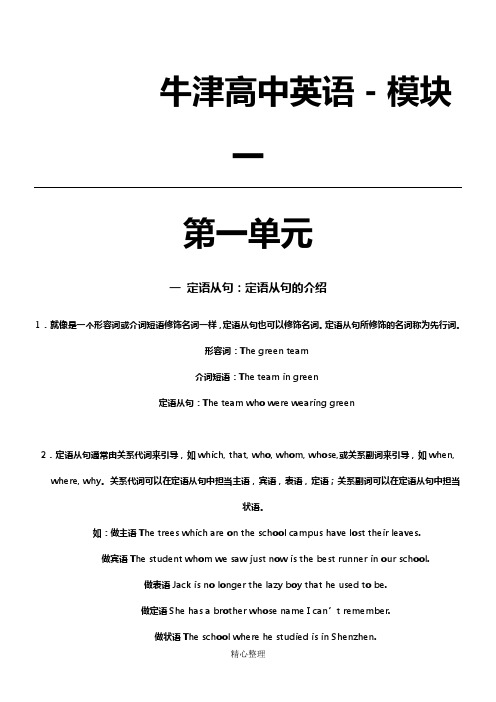
牛津高中英语-模块一1.2.做宾语The student whom we saw just now is the best runner in our school.做表语Jack is no longer the lazy boy that he used to be.做定语She has a brother whose name I can’t remember.做状语The school where he studied is in Shenzhen.二定语从句:关系代词:that,which,who,whom,和whose第二单元一定语从句:介词提前的定语从句(preposition+which; preposition+whom)1.当关系代词(which/whom)做定语从句中介词的宾语时,可以把介词提到关系代词的前面。
4.who和5.二定语从句:关系副词:when,where,why 1.我们通常用关系副词when 引导先行词是time,moment,day,season,year 等的定语从句。
如:Do you remember the day when we left you in charge?I often think of the moment when I saw the UFO.2.我们通常用关系副词where引导先行词是place,house,city,country,city,world等的定语从句。
如:The police searched the house where the thief had stayed.This is not a family where bad behavior goes unpunished.3.我们通常用关系副词why引导先行词是reason的定语从句。
如:I don’t know the reason why the house is so dirty.4.在更加正式的英语中,where,when和why能够被介词+which 所替代。
牛津高中英语语法总结
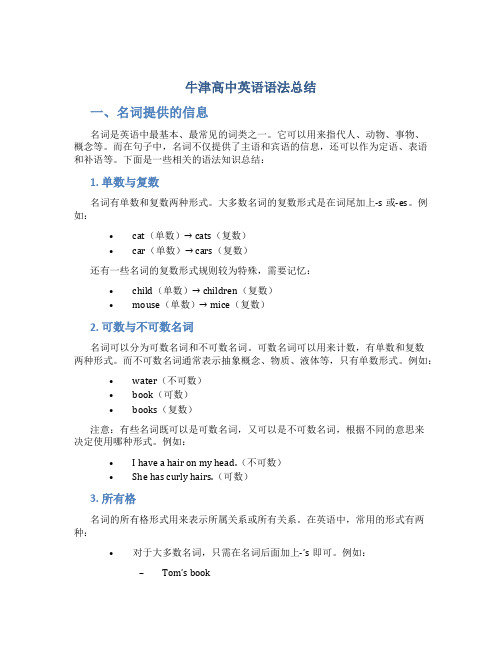
牛津高中英语语法总结一、名词提供的信息名词是英语中最基本、最常见的词类之一。
它可以用来指代人、动物、事物、概念等。
而在句子中,名词不仅提供了主语和宾语的信息,还可以作为定语、表语和补语等。
下面是一些相关的语法知识总结:1. 单数与复数名词有单数和复数两种形式。
大多数名词的复数形式是在词尾加上-s或-es。
例如:•cat(单数)→ cats(复数)•car(单数)→ cars(复数)还有一些名词的复数形式规则较为特殊,需要记忆:•child(单数)→ children(复数)•mouse(单数)→ mice(复数)2. 可数与不可数名词名词可以分为可数名词和不可数名词。
可数名词可以用来计数,有单数和复数两种形式。
而不可数名词通常表示抽象概念、物质、液体等,只有单数形式。
例如:•water(不可数)•book(可数)•books(复数)注意:有些名词既可以是可数名词,又可以是不可数名词,根据不同的意思来决定使用哪种形式。
例如:•I have a hair on my head.(不可数)•She has curly hairs.(可数)3. 所有格名词的所有格形式用来表示所属关系或所有关系。
在英语中,常用的形式有两种:•对于大多数名词,只需在名词后面加上-’s即可。
例如:–Tom’s book–The cat’s toys•对于以s结尾的复数名词,只需在名词后面加上-’.例如:–The boys’ bicycles–My parents’ house二、代词的使用代词是用来代替名词的词类。
它们可以用来避免重复,提高句子的流畅度。
常用的代词有人称代词、物主代词、反身代词、指示代词等。
人称代词人称代词用来指代特定的人或事物。
它们分为主格、宾格和所有格。
例如:•主格:I, you, he, she, it, we, they•宾格:me, you, him, her, it, us, them•所有格:my/mine, your/yours, his, her/hers, its, our/ours, their/theirs物主代词物主代词用来表示所有关系,表示某物属于某人。
苏教版牛津高中英语语法总结
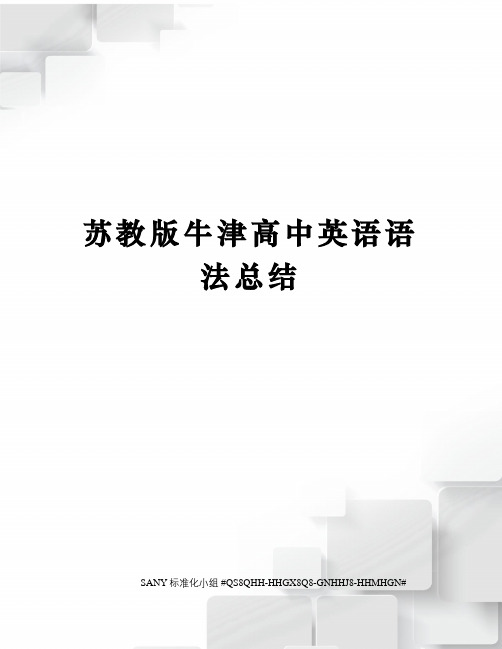
苏教版牛津高中英语语法总结SANY标准化小组 #QS8QHH-HHGX8Q8-GNHHJ8-HHMHGN#牛津高中英语-模块一第一单元一定语从句:定语从句的介绍1.就像是一个形容词或介词短语修饰名词一样,定语从句也可以修饰名词。
定语从句所修饰的名词称为先行词。
形容词:The green team介词短语:The team in green定语从句:The team who were wearing green2.定语从句通常由关系代词来引导,如which, that, who, whom, whose,或关系副词来引导,如when, where, why。
关系代词可以在定语从句中担当主语,宾语,表语,定语;关系副词可以在定语从句中担当状语。
如:做主语The trees which are on the school campus have lost their leaves.做宾语The student whom we saw just now is the best runner in our school.做表语Jack is no longer the lazy boy that he used to be.做定语She has a brother whose name I can’t remember.做状语The school where he studied is in Shenzhen.二定语从句:关系代词:that,which,who,whom,和whose1.在定语从句中,that和which用来指代物。
如:This is the story that /which we wrote for our storytelling contest.2.在定语从句中,who 用来指代人。
如:I am going to see a friend who has just come back from the UK. 3.当who在定语从句中做宾语时,可以用whom来取代,且whom比who更正式。
苏教版牛津高中英语语法总结优选稿
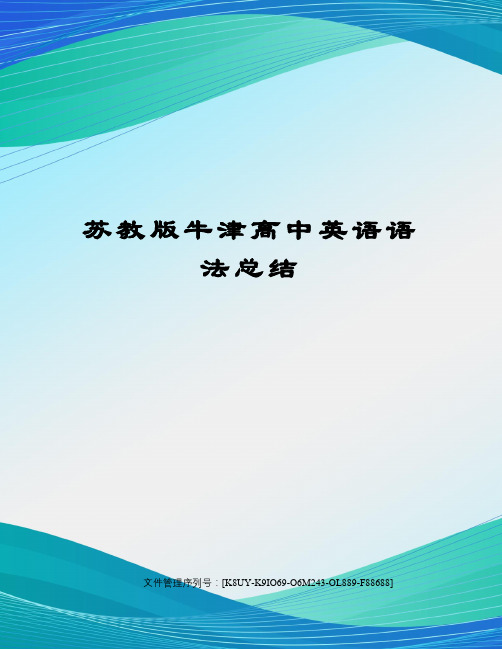
苏教版牛津高中英语语法总结文件管理序列号:[K8UY-K9IO69-O6M243-OL889-F88688]牛津高中英语-模块一第一单元一定语从句:定语从句的介绍1.就像是一个形容词或介词短语修饰名词一样,定语从句也可以修饰名词。
定语从句所修饰的名词称为先行词。
形容词:The green team介词短语:The team in green定语从句:The team who were wearing green2.定语从句通常由关系代词来引导,如which, that, who, whom, whose,或关系副词来引导,如when, where, why。
关系代词可以在定语从句中担当主语,宾语,表语,定语;关系副词可以在定语从句中担当状语。
如:做主语The trees which are on the school campus havelost their leaves.做宾语The student whom we saw just now is the best runner in our school.做表语Jack is no longer the lazy boy that he used to be.做定语She has a brother whose name I can’t remember.做状语The school where he studied is in Shenzhen.二定语从句:关系代词:that,which,who,whom,和whose1.在定语从句中,that和which用来指代物。
如:This is the story that /which we wrote for our storytelling contest.2.在定语从句中,who 用来指代人。
如:I am going to see a friend who has just come back from the UK.3.当who在定语从句中做宾语时,可以用whom来取代,且whom比who更正式。
苏教版牛津高中英语语法总结材料
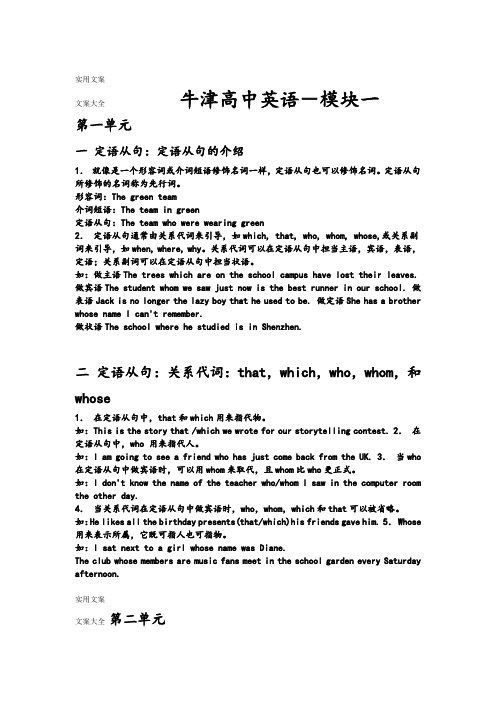
实用文案文案大全牛津高中英语-模块一第一单元一定语从句:定语从句的介绍1.就像是一个形容词或介词短语修饰名词一样,定语从句也可以修饰名词。
定语从句所修饰的名词称为先行词。
形容词:The green team介词短语:The team in green定语从句:The team who were wearing green2.定语从句通常由关系代词来引导,如which, that, who, whom, whose,或关系副词来引导,如when, where, why。
关系代词可以在定语从句中担当主语,宾语,表语,定语;关系副词可以在定语从句中担当状语。
如:做主语The trees which are on the school campus have lost their leaves. 做宾语The student whom we saw just now is the best runner in our school. 做表语Jack is no longer the lazy boy that he used to be. 做定语She has a brother whose name I can't remember.做状语The school where he studied is in Shenzhen.二定语从句:关系代词:that,which,who,whom,和whose1.在定语从句中,that和which用来指代物。
如:This is the story that /which we wrote for our storytelling contest. 2.在定语从句中,who 用来指代人。
如:I am going to see a friend who has just come back from the UK. 3.当who 在定语从句中做宾语时,可以用whom来取代,且whom比who更正式。
- 1、下载文档前请自行甄别文档内容的完整性,平台不提供额外的编辑、内容补充、找答案等附加服务。
- 2、"仅部分预览"的文档,不可在线预览部分如存在完整性等问题,可反馈申请退款(可完整预览的文档不适用该条件!)。
- 3、如文档侵犯您的权益,请联系客服反馈,我们会尽快为您处理(人工客服工作时间:9:00-18:30)。
牛津高中英语-模块一第一单元一定语从句:定语从句的介绍1.就像是一个形容词或介词短语修饰名词一样,定语从句也可以修饰名词。
定语从句所修饰的名词称为先行词。
形容词:The green team介词短语:The team in green定语从句:The team who were wearing green2.定语从句通常由关系代词来引导,如which, that, who, whom, whose,或关系副词来引导,如when, where, why。
关系代词可以在定语从句中担当主语,宾语,表语,定语;关系副词可以在定语从句中担当状语。
如:做主语The trees which are on the school campus have lost their leaves.做宾语The student whom we saw just now is the best runner in our school.做表语Jack is no longer the lazy boy that he used to be.做定语She has a brother whose name I can’t remember.做状语The school where he studied is in Shenzhen.二定语从句:关系代词:that,which,who,whom,和whose1.在定语从句中,that和which用来指代物。
如:This is the story that /which we wrote for our storytelling contest. 2.在定语从句中,who 用来指代人。
如:I am going to see a friend who has just come back from the UK. 3.当who在定语从句中做宾语时,可以用whom来取代,且whom比who更正式。
如:I don’t know the name of the teacher who/whom I saw in the computer room the other day.4.当关系代词在定语从句中做宾语时,who,whom,which和that可以被省略。
如:He likes all the birthday presents(that/which)his friends gave him. 5.Whose用来表示所属,它既可指人也可指物。
如:I sat next to a girl whose name was Diane.The club whose members are music fans meet in the school garden every Saturday afternoon.第二单元一定语从句:介词提前的定语从句(preposition+which; preposition+whom)1.当关系代词(which/whom)做定语从句中介词的宾语时,可以把介词提到关系代词的前面。
如:We thought you were a person from whom we could expect good decisions.2.在非正式英语中,介词通常放在定语从句的最后。
如:Art is the subject which I know little about.3.如果介词放在定语从句的最后,which 可以被that取代,whom可以被that和who 取代。
如:Dad is a person whom/that/who I can easily talk to.4.当关系代词做定语从句中介词的宾语,并且介词又放在定语从句的末尾时,我们通常省略关系代词who和that。
如:The topic (which) Eric is interested in is Physics.Daniel is the person (whom) I want to make friends with.5.当先行词是way时,我们用in which或that来引导定语从句,这种情况下,in which 或that 可以被省略。
如:I didn’t like the way (that /in which) she talked to me.二定语从句:关系副词:when,where,why1.我们通常用关系副词when 引导先行词是time,moment,day,season,year 等的定语从句。
如:Do you remember the day when we left you in charge?I often think of the moment when I saw the UFO.2.我们通常用关系副词where引导先行词是place,house,city,country,city,world 等的定语从句。
如:The police searched the house where the thief had stayed.This is not a family where bad behavior goes unpunished.3.我们通常用关系副词why引导先行词是reason的定语从句。
如:I don’t know the reason why the house is so dirty.4.在更加正式的英语中,where,when和why能够被介词+which 所替代。
如:The study is the place where/in which I often have talks with my father.This is the reason why/for which my parents got home earlier.It rained the whole day when/on which he traveled with his family.第三单元一定语从句:非限制性定语从句1.非限制性定语从句是一个为主句添加额外信息的从句,在非限制性定语从句前通常有个逗号。
如:Amy, who took weight-loss pills, now realizes that health is important.My pills are in the bathroom, where I always keep them.2.当先行词是整个主句时,可以用which来引导定语从句。
如:He missed the show, which was a great pity.3.我们可以用all+whom/which 来表示全部数量,用some of+whom/which来表示部分数量。
如:I am doing different types of exercises, all of which are quite helpful to my health.Many people, some of whom are not overweight, are going on diet.二附加疑问句1.附加疑问句是放在陈述句后面的短问句。
它们通常被用在口语中来引出一段对话,以一个更加礼貌的方式来询问信息,温柔的发号施令或要求某人做某事。
我们用附加疑问句来询问意见或征求同意。
当我们用附加疑问句来询问意见时,为了期待对方能同意我们的观点,附加疑问句会用降调来表达。
当我们用附加疑问句来征求同意时,我们实际上是在询问我们自己也不太能确信的事情,这时候附加疑问句会用升调来表达。
2.附加疑问句的构成有以下几种:1)在肯定的陈述句之后,我们会用否定的附加疑问句。
在否定的陈述句之后,我们会用肯定的附加疑问句。
如:We can still be friends, can’t we?He doesn’t like ice cream, does he?2)当主句中有像neither,none,nobody,nothing,few,little,never,hardly 或seldom这类词时,它们被认为是否定的,因此后面会跟个肯定的附加疑问句。
如:Neither of you will have coffee, will you?No one has found my CD, have they?Nobody understood his speech, did they?His sister seldom argues with people, does she?3)人称代词如I,we,you,he,she,it或they会放在附加疑问句中。
如:I was pretty silly, wasn’t I?Everyone has advises you not to go on a diet, haven’t you?4)助动词,情态动词或be动词会放在附加疑问句中。
如:You like traveling, don’t you?There is something wrong, isn’t there?You can’t speak Italian, can you?5)祁使句后用will you,Let’s后用shall we如:Post a letter for me, will you?Let’s have a break, shall we?牛津高中英语-模块二第一单元一现在完成时态1.我们用现在完成时态来表示在最近的过去发生的但跟现在有联系的事情。
如:The disappearance of Justin has made Kelly very unhappy.2.我们也用现在完成时态来表示在过去刚开始,并且现在还没结束的事情。
如:I have not seen Justin since last Friday night.3.当动作发生的确切时间不清楚或不重要时,我们也用现在完成时态。
经常连用的时间短语有:already ever for just lately never recently since yetalready 用语肯定句,yet用语否定句。
如:The boy has already come home. I haven’t heard anything from him yet.for+一段时间since+点时间如:We haven’t seen him for two years. We haven’t seen him since 2002. 注:当已给定具体的时间时,我们往往用一般过去时态,而不是现在完成时态。
